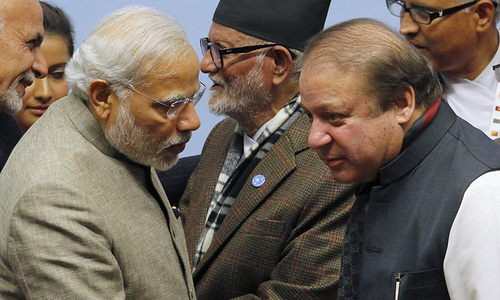WASHINGTON: The next round of India-Pakistan water talks — that the World Bank offered to hold in Washington next month — may be delayed or cancelled because of India’s refusal to accept arbitration.
Pakistan not only wants the talks to be held as scheduled but is also seeking the World Bank’s arbitration as the guarantor of the Indus Waters Treaty.
But Indian officials told reporters in New Delhi on Wednesday that India was against such arbitration and preferred negotiations within the framework of the treaty.
Pakistan too recognises the treaty’s pivotal role but disagrees with the Indian interpretation, which seeks to minimise arbitration.
The proposed talks will focus on two controversial hydropower projects — Kishanganga and Ratle — over which Pakistan is seeking International Court of Arbitration through the World Bank.
Indian and Pakistani officials met in Islamabad and Lahore this week to discuss three Indian projects on the Chenab River that Pakistan fears would decrease the flow of water into its territory.
After the meetings, Water and Power Minister Khawaja Asif told reporters that talks on the Kishanganga and Ratle hydroelectric schemes would be held in Washington next month, with the World Bank as the mediator.
But officials in New Delhi told the Indian media that they had not received any formal communication about the Washington meeting. They also said that India opposed Pakistan’s proposal for the bank’s mediation or arbitration and would prefer a neutral expert to review the two projects and give his or her opinion.
Pakistan says it wants a decision that is legally binding on both India and Pakistan and such a decision can only come from a court of arbitration and not from a neutral expert.
Late last year, New Delhi suspended talks on the treaty, which distributes the eastern tributaries of the Indus — Sutlej, Beas and Ravi to India and the western tributaries — Jhelum, Indus and Chenab — to Pakistan.
In September 2016, Indian Prime Minister Narendra Modi threatened to scrap the treaty after a terrorist attack killed 19 Indian soldiers. Pakistan warned that any such move would be a “declaration of war”.
Pakistan has repeatedly accused India of violating the treaty by building dams on the western rivers. India says that the treaty unduly favours Pakistan by giving it a greater share of water.
“Pakistan wants the World Bank to continue to play its role as the guarantor of the treaty,” an official source told Dawn in Washington. “The Pakistanis fear that India is trying to undermine the bank’s role as the repository of this treaty.”
The World Bank first seemed interested in Pakistan’s proposal for arbitration over Kishanganga and Ratle projects “but may opt out under India’s pressure”, the source added.
Pakistan has also said that it wants a resolution “through the provisions of the treaty, in their letter and spirit”, and “not through India’s interpretation of the agreement”.
A similar meeting, held in November 2016, made little progress as India rejected the World Bank’s terms of reference because, it claimed, the terms favoured Pakistan’s demand for arbitration.
Published in Dawn, March 23rd, 2017













































